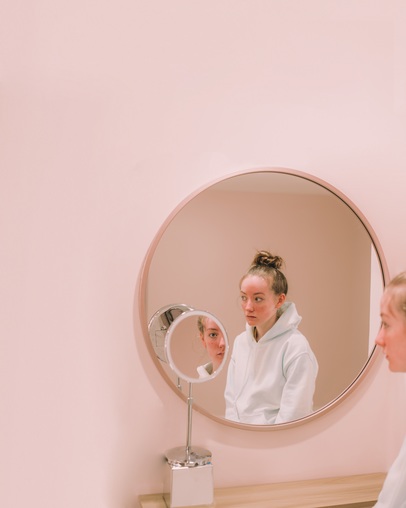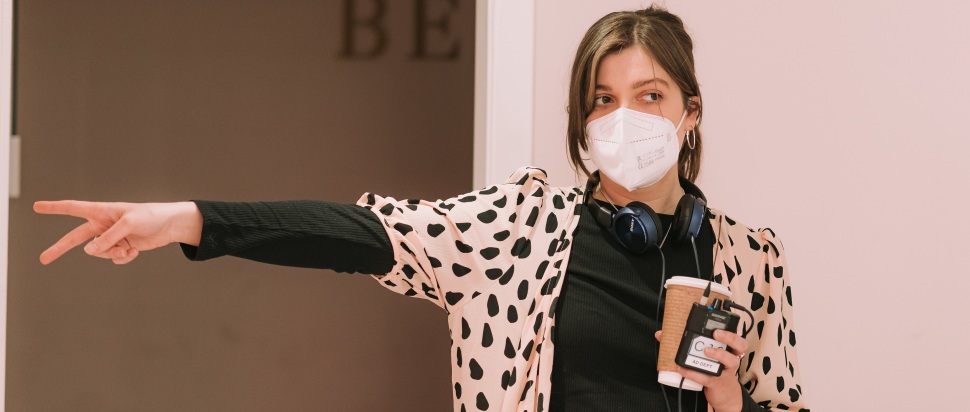Scotland on Screen: Leyla Coll-O’Reilly on Groom
We speak to poet and theatre-maker Leyla Coll-O’Reilly (aka Leyla Josephine) about Groom, her stunning new short about a taciturn teenage girl entering the intimidating world of a hypersexualised beauty salon
Leyla Josephine is an artist who’s so multi-hyphenated and so multi-talented that one name isn’t quite enough to cover her practice. Under that title, you probably know her as an award-winning poet and theatre-maker, but you might be less familiar with her work as filmmaker Leyla Coll-O’Reilly. “Originally, I wanted to go by Leyla Coll-O’Reilly in film and Leyla Josephine in poetry,” she explains when I bring up my uncertainty about her preferred moniker during our chat. “But actually now they're kind of merging, so I can see your confusion.”
We’re speaking to her by phone while she’s currently in Leyla Josephine mode, touring Ireland with her first poetry collection, In Public/In Private, although the bulk of our conversation revolves around her brilliant short film Groom, which was recently nominated for a BAFTA Scotland award. It’s a startling debut, jagged, tangy and visceral. It follows a 15-year-old school leaver called Hannah (Mollie Milne) during her trial shift at a beauty salon where she encounters a toxic work environment and, in Skye (Michelle Donnelly), a boss who wants to groom her naive new protege in more ways than one.
Coll-O’Reilly had already written a few scripts and film treatments before she struck on the idea for Groom, which sprung up around the beginnings of the #MeToo movement. “There were a lot of conversations going on back then about the abuse of power,” she recalls, “and they were all coming from the perspective of a man abusing their power. But for me and my producer Laura McBride, we were talking about how women abused their power, but in quite different, often more manipulative ways. We were interested in telling the story of that. But it's also a story about bisexuality and puberty and not quite knowing, not being able to read the relationship. I was interested in that period when you're a teenager and inexperienced and trying to read signs but not being able to.”
The beauty salon setting, with its mix of heightened femininity and Cronenbergian sense of body manipulation and transfiguration, proves a potent arena in which to stage this story of a young woman being moulded and reformed before our eyes. “I always try to think really holistically when I'm writing,” says Coll-O’Reilly. “What environments will fit the story the best? What sounds will suit it best? What textures will work best?” The beauty salon would give her the perfect location. “It’s a self-contained single location that's hypersexual and it’s visually beautiful, but there’s also just a feeling there of mutilation, and of bodies changing so they're unrecognisable,” she says. “That all ran parallel to the way that Hannah was changing as a character due to her interactions with the other characters. So it was a fun cortex to play within.”

Groom
Scotland has a fine tradition of filmmaking poets, from Margaret Tait, the GOAT, to Coll-O’Reilly's peer Sean Lìonadh, director of Too Rough. Despite this, Coll-O’Reilly says she’s been met by surprise in some quarters for her pivot to directing. “People always ask me, ‘Oh, poetry to films, it must have been such a hard jump,’ but actually poetry is not that far away from filmmaking.” On the contrary, she reckons there are loads of similarities: “In both, you’re constantly trying to edit things down to go back to your core questions, your core themes. And like filmmaking, poetry requires you to choose images through your writing because you are actually painting in the reader's mind. You choose very carefully what the reader sees.”
There’s certainly poetry in Groom. This might be partly down to the influence of the poetic Scottish filmmaking of Lynne Ramsay, who acted as a mentor for Coll-O’Reilly on the project, which was made through Lothian Films. “Lynne is one of my favourite filmmakers,” explains Coll-O’Reilly, “and what I love about Lynne’s work is that she never gives her audience all the answers. She really leaves spaces for questioning.” Coll-O’Reilly does something similar in Groom, particularly when it comes to the central relationship between Hannah and her glamorous new boss, Skye. “I didn't want to make it black and white,” she says. “I didn't want to be like, ‘Skye is an abuser and she's a bad person’.”
The focus instead is the inscrutable Hannah. “The whole time I wanted the audience to be wondering, is Hannah comfortable in this situation? Is she safe in this situation? And are there sexual undertones? Within the whole thing, I don't think I'm ever like: yes, she's being abused? I think that's what we were really pushing for, because sometimes when you are in situations that are unsafe, they don't always feel unsafe or you're not always sure. And sometimes when you feel unsafe, you actually are safe. I wanted to put the audience in that viewpoint of not knowing either, I suppose. That's perfect for the short film form, right? Because you don't have to go into all the psychology of it and the backgrounds. You're just making an offering and letting the audience decide for themselves.”
Filmography: Groom (2022)
Stage: Daddy Drag (2019), Hopeless (2017), HOWL[ing] (2014), What a Fanny! (2013)
Collected poetry: In Public/In Private (2022)
In Public/In Private is out now, published by Burning Eye Books and available at leylajosephine.co.uk
t: @LeylaJosephine1
i: @leylajosephine
